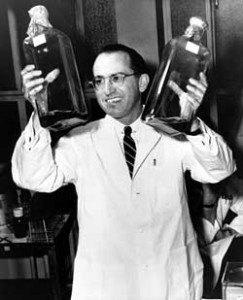Visit and Join the WeHeal Vaccination Community
For more information, see: Wikipedia | Mayo Clinic

A vaccine is a biological preparation that provides active acquired immunity to a particular disease. A vaccine typically contains an agent that resembles a disease-causing micro-organism and is often made from weakened or killed forms of the microbe, its toxins or one of its surface proteins. The agent stimulates the body’s immune system to recognize the agent as a threat, destroy it, and keep a record of it, so that the immune system can more easily recognize and destroy any of these micro-organisms that it later encounters.
The administration of vaccines is called vaccination. The effectiveness of vaccination has been widely studied and verified; for example, the influenza vaccine, the HPV vaccine, and the chicken pox vaccine. Vaccination is the most effective method of preventing infectious diseases; widespread immunity due to vaccination is largely responsible for the worldwide eradication of smallpox and the restriction of diseases such as polio, measles, and tetanus from much of the world. The World Health Organization (WHO) reports that licensed vaccines are currently available to prevent or contribute to the prevention and control of twenty-five infections.
Vaccines can be prophylactic (example: to prevent or ameliorate the effects of a future infection by any natural or “wild” pathogen), or therapeutic (e.g., vaccines against cancer are also being investigated; see cancer vaccine).
The terms vaccine and vaccination are derived from Variolae vaccinae (smallpox of the cow), the term devised by Edward Jenner to denote cowpox. He used it in 1798 in the long title of his Inquiry into the…Variolae vaccinae…known…[as]…the Cow Pox, in which he described the protective effect of cowpox against smallpox. In 1881, to honour Jenner, Louis Pasteur proposed that the terms should be extended to cover the new protective inoculations then being developed.
Visit and Join the WeHeal Vaccination Community
For more information, see: Wikipedia | Mayo Clinic
WeHeal is very grateful to our valued sources of information which include Wikipedia, WebMD, ClinicalTrials.gov, Cancer.gov, Infoplease, and the US CDC (Center for Disease Control).